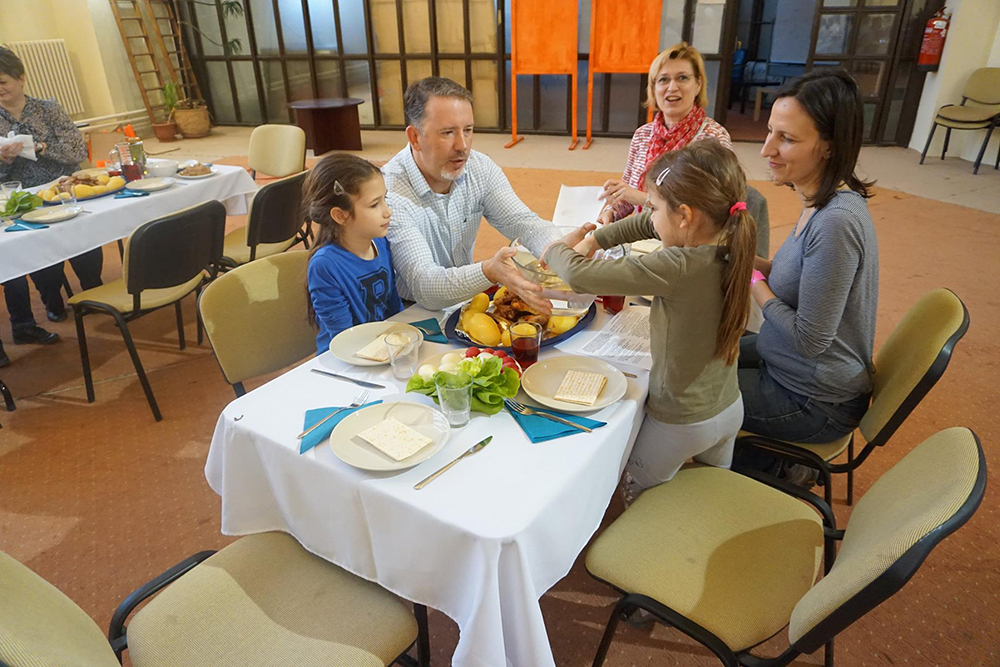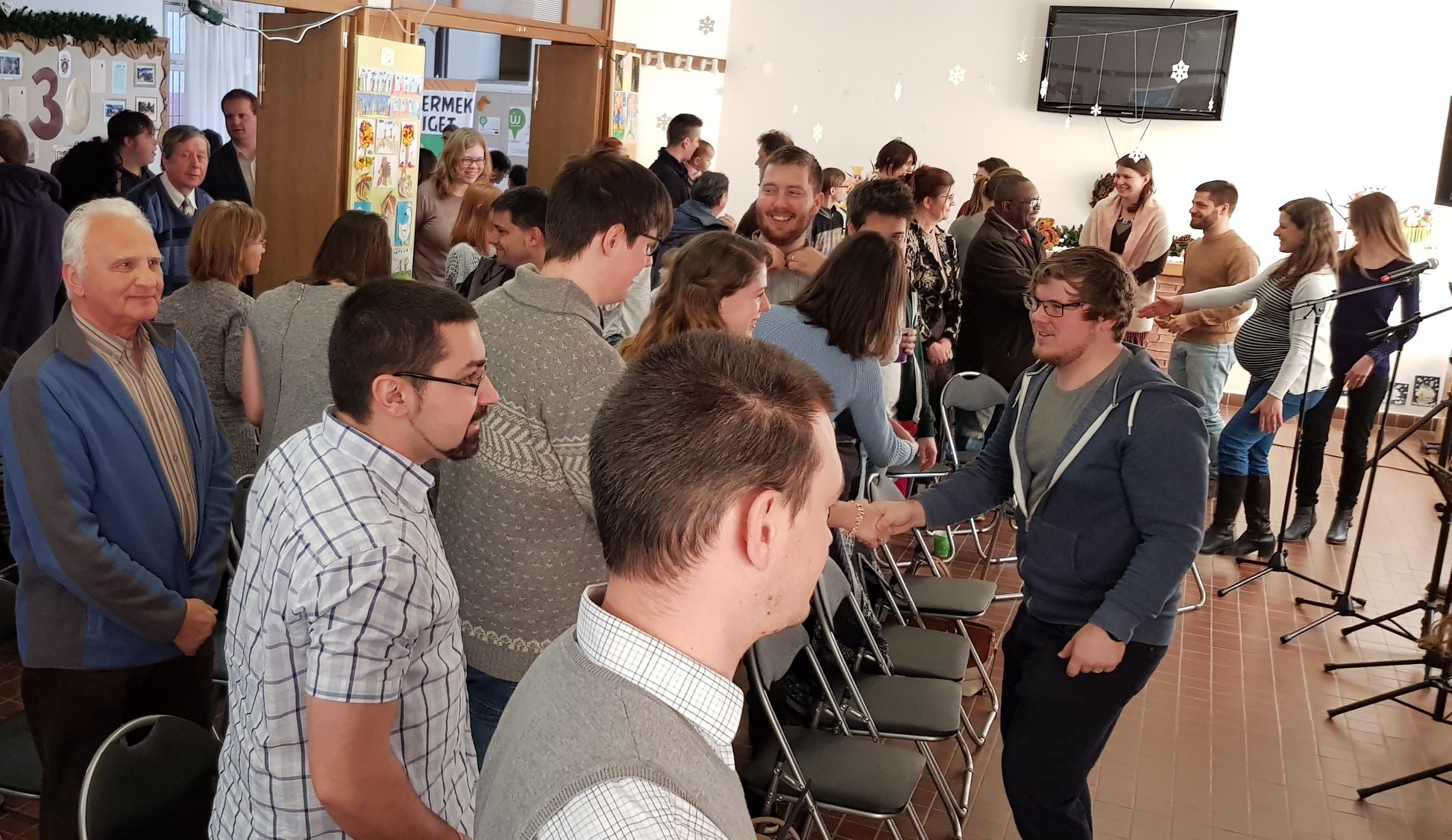Úrréti Református Gyülekezet is not like other Hungarian churches. The church meets in a school instead of a sanctuary. Its pastor, Daniel Püski, does not wear the traditional black robes. The congregation is young, most of them in their 20s and 30s. Worship is led by a praise band and includes both contemporary music and traditional hymns. But the most unusual thing about Úrréti Református (in English, Lord’s Meadow Reformed Church) might be that it’s a church plant, barely a year old.
In Hungary, a secularized country where the church was controlled by the government for many years under communism, church plants are a rarity. The Reformed Church in America is partnering with Püski and his denomination, the Reformed Church in Hungary, to change that.
“In an American context, church planting might seem like quite a normal thing,” says Püski. “But we forgot our way of starting churches 70 years ago. We have to help entire churches remember that we should start churches. And not just the old way of building a church building and waiting for people to come. This is a new kind of process for the entire Hungarian church.”
Püski’s vision for a new kind of Hungarian church began to take root more than a decade ago. A university chaplain in Debrecen, Hungary, Püski wanted to start a student congregation with contemporary worship like he had experienced in North America. During a trip to West Michigan, he reached out for help from a church planter he’d heard about: Doug McClintic.
Püski asked if he could visit McClintic to learn more about church planting. He ended up staying with McClintic for a week.
“We got to know each other, and I tried to help him with anything that I could. We went around and saw different church plants,” McClintic says.
After Püski returned to Hungary, he started Debrecen Reformed University Congregation. The success of that congregation led to student churches on two more university campuses. McClintic, now a missionary focused on global church planting, continued to provide support. And churches in Michigan joined him: Fifth Reformed Church in Grand Rapids, Grace Ann Arbor, Centerpoint Church in Kalamazoo, and Harbor Churches, a collegiate church in West Michigan.

There aren’t many church plants in Hungary, but Úrréti Református is one of them. And it’s doing church differently.
But Püski noticed a problem. Once students graduated from university, they struggled to find a church home in Debrecen.
“There are about 20 churches in Debrecen, all very traditional in style,” says Püski. “So young people who were used to our contemporary services struggled to find a church. About two years ago, I went to several local churches and asked if we could figure out how to find them a church home after graduation. We explored a lot of different options and finally decided to start a new church with almost the same style as the university church. The difference was that this would be a fully fledged local church, not a student church.”
Püski gathered a core group, mostly former members of his student congregation, to serve as the founding members of the new church. This group carefully considered everything from how people would be greeted to what Püski would wear when he preached. They held preview services and even began to attract some new members, though the contemporary style took some visitors by surprise.
“A couple weeks before our launch, a young family showed up who had just moved to the city,” says Püski. “They were part of a Reformed church in the countryside before. And after the service, they said, ‘We actually like our traditional style, but it was very nice to be here.’ We said, ‘We’re glad you came, but it’s okay if you find a home in a more traditional church.’ We didn’t expect to see them again. But the next week they came back. And then the week after that. Now they’re very enthusiastic members.
“Even though they like the traditional style, they realized that if they want to renew the church, they have to make some changes and let some things go. That’s very typical of our members.”
Last February, Úrréti Református was finally ready for its official launch.
“Everyone was really enthusiastic that morning about preparing the music and setting up the chairs and loud speakers. There was a buzz. And people just started to come. I was really surprised to have so many people,” says Püski.
More than 200 people came to the service, including McClintic and other leaders from the RCA churches that support Úrréti Református. Püski preached on the story of the prodigal son.
“If you use it in a way that the Lord has two sons, one at home and one away, you can speak to both Christians and non-Christians. So I chose that story intentionally for the launch,” says Püski.

Úrréti Református lives out church in new ways in Hungary.
Úrréti Református has continued to grow steadily since then, even attracting some people who are unchurched.
“At first, we had more or less previous students and some friends. Then more and more people from other backgrounds, some unchurched people, local people of the neighborhood, began to visit. We have grown from a launch group of about 30 to more than 70 members,” says Püski.
At the end of August, the congregation gathered for church camp in the mountains. That’s when it hit Püski.
“I realized this is, for many of them, their home church,” he says. “They aren’t just here to help the church launch. That was an important feeling, that this is a home for many people.”
Evangelizing in such a secular context is still a challenge. “Although the church plant is thriving, I wouldn’t say we’ve figured out the key to reaching the totally secular population,” Püski says. But Püski is excited about how God is working; he prays his excitement is contagious.
“I hope that we can inspire others to start churches in other cities around the country, especially for younger generations,” Püski says. “I have quite a few colleagues and friends who are interested in my work, so we’ll see where God leads them.”
Support
Doug McClintic is now living in Europe, working with the next generation of European churches. Support Doug’s work at www.rca.org/mcclintic.
Grace Ruiter co-founded Faithward and oversaw its growth from a small blog to a ministry that reaches 100,000-200,000+ people each month. She has been asking too many questions ever since she started talking, and she has no plans of stopping now. Although her curiosity has challenged her faith at times, it's also how her relationship with God has grown to where it is today. You can get in touch with Grace at graceruiterwrites@gmail.com.




